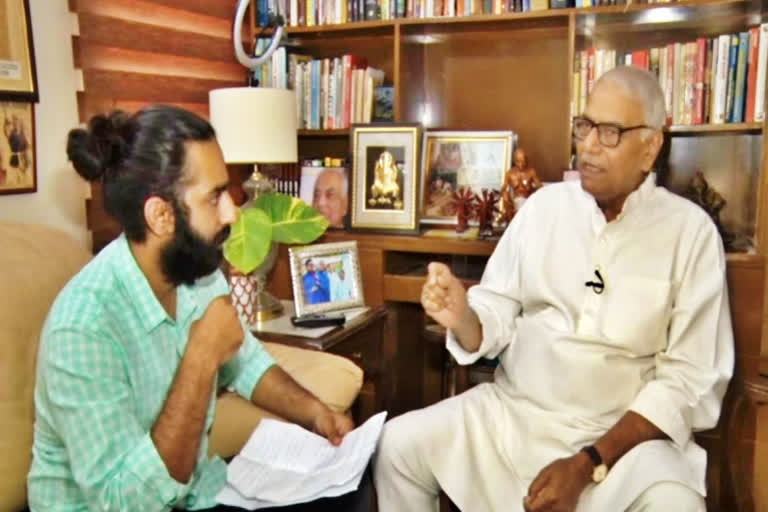New Delhi: India is witnessing a rise in the incidents of communal violence. Clashes in Karauli, Hubbali, and Jahangirpuri are some of the recent examples of this wave of intolerance. While many are pointing fingers toward the ruling right-wing BJP for fuelling the tension in the country, the party in turn has accused the opposition of appeasement politics.
Speaking over the scenario, Yashwant Sinha, former BJP leader and current TMC vice president, in an exclusive interview with ETV Bharat's Saurabh Sharma, said raking up issues like Hijab, Halal, Azaan and the recent clashes are not accidental but "part of a grand design" of the ruling BJP.
Here are the excerpts from the interview:
ETB: Looking at the current socio-political environment, do you think that the unity of India and the secular principles are in danger?
Sinha: Yes, indeed they are. If you look at the kind of events that have happened, be it the hijab issue, the ban on the use of loudspeakers during Azaan, and the communal violence, they all are a part of a design to divide society along communal lines, between Hindus and Muslims. The strategy is to divide the nation between the majority 80% and the minority 20%. It's an electoral strategy to maintain their position in power.
ETB: You were with Janta Dal and then with BJP for several years. What forced you to quit the saffron party?
Sinha: BJP had taken a very wrong path. I've never felt the suffocation that I felt under PM Modi. If you compare PM Modi with former PM Vajpeeyei Ji, they are poles apart. Their approach, personality, and outlook are poles apart and therefore working with Mr Vajpayee Ji was a pleasure. Unfortunately, I cannot say the same about Modi.
ETB: There are people in political circles who say that you left BJP because you were not given a key ministerial post. What would you say about it?
Sinha: It's a very cheap allegation. I resigned from the IAS with 12 years of service still left. Which mad man will do this? I did not accept a ministerial post when I was being offered one by late VP Singh in 1989. I've always stood by my principles even if it means leaving important positions. Ask any BJP guy? Will they do it?
ETB: When was the last time you had an interaction with PM Modi or with Amit Shah? Are you still in touch with any BJP members who are in the cabinet?
Sinha: I have not met Amit Shah. The last time I met PM Modi was in 2014 when I invited him for the railway line inauguration in Hazaribagh. And he accepted my offer and even came there. It was the last time I met him or had a conversation with him.
ETB: Why is PM Modi and the BJP reluctant to talk to you?
Sinha: They fear me. And when a person thinks that he knows everything and that he understands all things, then he doesn't need anybody alongside him. That is the case here. It was not the party that expelled me but rather it was I who stood by my principles and resigned from the party.
ETB: Coming to TMC, West Bengal is notorious for its political violence since the 1990s. Even now the violence continues. Don't you think that this is also an attack on Democracy?
Sinha: It is very unfortunate if any such violence happens in any part of the country. But one should also look at the fact that whenever any violence happens in West Bengal, it gets sensationalized on social media, and a narrative is put forward. But amidst this, we all forget that the political violence or violence in other states such as Uttar Pradesh or even Bihar is even worse but it does not get the same social media attention.
ETB: The Concerned Citizens’ Group--a civil society group led by you in Kashmir--has released a report which says that the backing of 'Kashmir Files' puts minorities and mainstream politicians in J&K at risk. How is the situation now?
Sinha: There is strong resentment among Kashmiris. The way the Government of India is treating them is extremely worrying. There is a narrative being put forward that everything is normal there and that tourists are coming in heavy numbers. But tell me, why would the people of Kashmir have an issue with these tourists? It is because of them that they earn their bread and butter. But do we just need bread and butter for a living? PM Modi had talked about "Dil ke doori aur Delhi se Doori" needs to be decreased but it seems he just coined the term without even understanding what it meant.
ETB: What's your take on India's Foreign Policy in the backdrop of the Russia-Ukraine war? Are we on the right side of history?
Sinha: Foreign Policy usually works on realism, national and strategic interests and there is very less scope for moral principles. But in this instance when India and Russia have very cordial relations, India should have talked to the Russian side in the initial phase. We should at least condemn their actions or could have played the role of a mediator as Turkey and Israel did.
During my tenure as an External Affairs Minister, the parliament in 2003 unanimously passed a resolution condemning the American invasion of Iraq and after this, I said that while there may be differences between India and America, our relations should continue. And that was a fine approach. Pandit Nehru had set up a very fine balance of Foreign Policy which gave weightage to moral principles as well and in this Russia-Ukraine war, we should have taken that approach but on the contrary, we are just appearing neutral.



